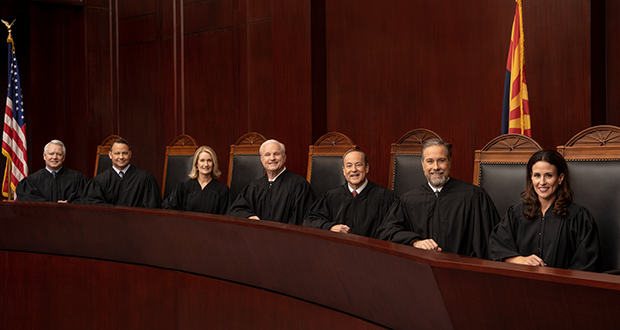The Arizona Supreme Court from left are Justice Bill Montgomery, Justice John R. Lopez, Vice Chief Justice Ann Scott Timmer, Chief Justice Robert Brutinel, Justice Clint Bolick, Justice James Beene, and Justice Kathryn H. King
By Nick Phillips | Arizona Capitol Times
As in most recent election years, Arizonans will probably get the chance to vote on several ballot initiatives this November, but this year’s measures come on the heels of court rulings that have blocked a pair of high-profile proposals.
Last week, the Arizona Supreme Court said they’ll keep off the ballot Proposition 307 – a citizen referendum that would have let voters approve or reject a tax cut legislators passed last year. And last month, a Maricopa County judge tossed out Proposition 208, a measure voters passed in 2020 that would have imposed a tax on high earners to increase public education funding. Judge John Hannah wrote in his opinion that an earlier ruling by the Arizona Supreme Court effectively forced him to strike down the measure.
The outcomes are leading Democrats to cry foul about the court’s role and raising questions about the future of ballot measures as a policy tool.
“I think the court has made it obvious that they’re not afraid to … legislate from the bench,” said Julie Erfle, a Democratic consultant and commentator. David Lujan, who helped organize Prop. 208 and backed Prop. 307, said he is “frustrated that the Supreme Court continues to block the voice of voters.”
Roy Herrera, a Democratic attorney, said he has counseled clients that are thinking about mounting a ballot measure campaign that there’s a legal risk.
“If you’re trying to pursue a progressive ballot measure … you’re going to get challenged legally in every which way,” Herrera said. “And you’re going to be dealing with a court that seems to have a political leaning and that’s going to make it very difficult.”
Republicans, including Gov. Doug Ducey, have largely applauded the court’s moves. “This ruling is another big win for our state’s taxpayers,” the governor said last week, after the court ruled to keep Prop. 307 off the ballot.
Kory Langhofer, a GOP attorney who represented the Arizona Free Enterprise Club, which brought the suit against Prop. 307, disputed complaints about overreach. “You can’t say: ‘I keep losing, so the refs are biased,’” he said. And he downplayed the impact of the recent cases: “It’s not been a sea change, even though there’s been two cases here in the last six months.”
Citizen ballot measures – both original initiatives and referenda on laws passed by legislators – are a regular feature of Arizona elections. Except for 2014, there’s been at least one citizen ballot measure in every statewide election year going back at least three decades. The measures touch on a wide range of issues, from legalizing marijuana to regulating the payday loan industry.
In general, citizen initiatives and referenda are more commonly used by Democrats in Arizona, since they can serve to bypass the state’s Republican-majority Legislature.
Legal challenges touch just a fraction of all ballot measures, but the courts are getting involved more often of late. “Challenges to initiative petitions have increased, I’d say in the last four years,” said Andrew Gould, a Republican and former Arizona Supreme Court Justice who’s now running for attorney general.
The Arizona Supreme Court from left are Justice Bill Montgomery, Justice John R. Lopez, Vice Chief Justice Ann Scott Timmer, Chief Justice Robert Brutinel, Justice Clint Bolick, Justice James Beene, and Justice Kathryn H. King
The results haven’t been all bad for those backing ballot measures. For instance, in 2017, the Arizona Supreme Court rejected a challenge brought by business groups against Proposition 206, a measure voters passed in 2016 that raised the minimum wage and created mandatory sick leave.
That ruling was among the first after Gould and John Lopez joined the court in 2016, following Ducey’s controversial proposal to expand its membership to seven from five justices.
Herrera said he’s not sure whether the move made a difference in recent rulings. “The court was already all Republican before, so it’s a little bit hard to tell whether the outcomes would be different,” he said.
Still, the two recent cases have left some on the left reconsidering their tactics.
Herrera said one solution for frustrated Democrats could be to focus on gaining more representation at the Capitol – flipping legislative seats and electing candidates to statewide offices like the governorship. “That’s, ultimately, the only backstop we have to this kind of stuff, is to have actual elected officials,” he said. Erfle said that’s what she expects – “My guess is that a lot of these groups are going to start shifting their resources more heavily into elections.”
But Lujan pointed out that ballot measures present an easier route than legislation for policies that seek to raise revenue. That’s because if lawmakers want to raise taxes, they need two-thirds majorities in both the House and Senate. “Even if you flip the Legislature, that makes it difficult,” he said. “So that’s why we’ve had to rely on ballot measures in the past, and likely in the future, in order to raise the revenue that we need for schools.”
He said education groups might come back with another ballot measure in 2024, or 2026. But he did suggest that, if backers can gather enough support from lawmakers, working through the Legislature could be a better way to get an initiative on the ballot. “The other way to do this, hopefully in the future, would be to elect a Legislature that, rather than have to do ballot measures, they can refer something to the ballot,” he said.
In the meantime, this year’s ballot is likely to feature a handful of initiatives, including some with conflicting mandates. And even with Prop. 307 gone, progressive groups won’t be sitting this cycle out. The coalition Arizonans for Fair Elections is collecting signatures to get a sweeping initiative onto the ballot that would rewrite election laws – and limit legal challenges to citizen initiatives.
Gould said it’s not ideal to have ballot measures or courts deciding the fate of policy – a better solution would be for lawmakers to be more responsive to constituent demands. “If the Legislature was more active, then maybe people wouldn’t see the need to resort to” ballot measures and legal challenges, he said.
But he added that there’s a certain inevitability to legal challenges when major policies are at stake: “Our society is one in which every important issue, sooner or later, ends up in the courts,” Gould said.












